英语B级考试知识点
大学英语B级语法 重点

大学英语B级统考之语法概要动词的基本时态A. 知识要点1.一般现在时态动词形式为do 或does (第三人称单数)。
通常表示客观事实或真理;或表示经常发生的、习惯性的动作或存在的状态。
e.g. He always goes to school by bike.他总是骑车去上学。
2.一般过去时态动词形式为did. 表示过去时间所发生的动作或存在的状态,常与过去特定的时间状语连用;或表示过去某一段时间一直持续或反复发生的动作,可与表示频度的时间副词连用。
e.g. I bought this computer five years ago.我在五年前买了这台电脑。
3.一般将来时态动词形式为will do/ shall do /be going to do. 表达在未来某个时间将要发生的动作或存在的状态。
e.g. The telephone is ringing. I will answer it.电话在响,我去接。
4.现在进行时态动词形式为is/am/are+ doing,表示此时此刻或现阶段正在进行的动作。
e.g. The police are looking for the two missing children.警察们正在寻找两个丢失的孩子。
5.过去进行时态动词形式为was/were + doing,表示过去某个时刻正在进行的动作。
(主语是I,she,he 时用was)e.g. Jane burnt her hand when she was cooking the dinner.当简在煮晚饭时她的手被烧伤了。
6.现在完成时态动词形式为have / has done,常与already,recently,never,ever, yet,since连用。
用来表示过去发生的对现在有影响的动作。
e.g. The milk has already become undrinkable 牛奶已经不能喝了。
大学英语B级考试复习资料
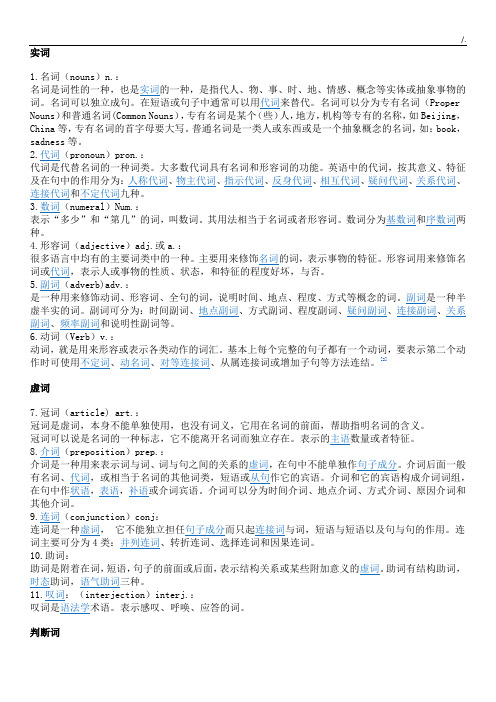
5.一般疑问句:be放于句首;will/shall提到句首。
{首字母大写}6.例句:They are going to have a competition with us in studies.他们将有一场比赛和我们一起研究。
It is going to rain.天要下雨了。
一般过去将来时1.概念:立足于过去某一时刻,从过去看将来,常用于宾语从句中。
2.时间状语:The next day (morning \, year…),the follow ing month(week…),etc.3.基本结构:主语+ was/were + going to + do + 其它;主语+ would/should + do +其它4.否定形式:主语+ was/were + not + going to + do; 主语+ would/should + not + do.5.一般疑问句:was或were放于句首;would/should 提到句首。
6.例句:He said he would go to Beijing the next day.他说他第二天要去北京。
I asked who was going there.我问,谁要去那里。
现在进行时1.概念:表示现阶段或说话时正在进行的动作及行为。
2.时间状语:Now, at this time, days, etc. look, listen3.基本结构:主语+ be + doing + 其它4.否定形式:主语+ be + not +doing + 其它5.一般疑问句:把be动词放于句首。
6.例句:How are you feeling today? 你今天感觉如何?He is doing well in his lessons.在课上他表现得很好。
过去进行时1.概念:表示过去某段时间或某一时刻正在发生或进行的行为或动作。
2.时间状语:at this time yesterday, at that time或以when引导的谓语动词是一般过去时的时间状语等。
大学英语B级考试复习资料

大学英语B级考试复习资料(总17页)-CAL-FENGHAI.-(YICAI)-Company One1-CAL-本页仅作为文档封面,使用请直接删除现代汉语中表示条件、让步、转折等关系的连词多包含一个来自判断词“是”的语素,其他语言也有类似的情况。
英语中的判断词有常见的“Yes”和“No”。
情态动词情态动词是一种本身有一定的词义,但要与动词原形及其被动语态一起使用,给谓语动词增添情态色彩,表示说话人对有关行为或事物的态度和看法,认为其可能、应该或必要等。
情态动词后面加动词原形。
1)情态动词不能表示正在发生或已经发生的事情,只表示期待或估计某事的发生。
2)情态动词除ought 和have 外,后面只能接不带to 的不定式。
3)情态动词没有人称,数的变化,即情态动词第三人称单数不加-s。
4)情态动词没有非谓语形式,即没有不定式,分词,等形式。
感叹词感叹词是用来表示说话时表达的喜怒哀乐等情感的词。
它不构成后面句子的一个语法成分,却在意义上与它有关联,后面的句子一般说明这种情绪的性质、原因。
感叹词是英语口语中最富于表现力的词语之一,用途甚广。
学会它,对于提高英语的交际能力,表达复杂的思想起着举足轻重的作用。
英语中的感叹词很多,但目前的语法着作中却很少对它进行归纳总结,致使许多人对含有感叹词的句子理解不透。
现将部分感叹词的用法进行小结:一、Oh 表示惊讶、指责、痛苦、称赞、懊恼等,可译为“哦”、“哎呀”、“噢”“啊”、“呀”等。
1. "Oh, who was that" Mr. Black asked. “哦,是谁”布莱克先生问。
2. "Oh, how blind you are!" he cried. “哎呀,你们真瞎!”他大声道。
其他1、动名词:动名词是一种兼有动词和名词特征的非限定动词。
它可以支配宾语,也能被副词修饰。
动名词有时态和语态的变化。
2、动词不定式:不定式定义:由to+动词原形构成。
英语B级语法考点完整版

B级考试词汇语法要点解析Ⅰ虚拟语气一. 概念虚拟语气用来表示说话人的主观愿望或假想,所说的是一个条件,不一定是事实,或与事实相反。
二.在非真实条件句中的应用☆非真实条件句表示的是假设的或实际可能性不大的情况,故采用虚拟语气。
☆时态:可以表示过去,现在和将来的情况。
它的基本特点是时态比真实语气退后。
1. 主语从句中的虚拟语气主语从句中的虚拟语气主要取决于某些形容词和过去分词,用来表示建议、命令、要求、惊异和失望等。
其形式为:It is/ was +adj. +(should)动词原形…。
常这样用的形容词有:appropriate 适当的advisable 适当的,合理的better 较好的desirable 理想的essential 精华的imperative 迫切的important 重要的insistent 坚持的natural 自然的necessary 必要的preferable 优越的,较好的strange 奇怪的urgent 紧迫的vital 极其重要的常这样用的过去分词有:desired, demanded, ordered, requested, suggested, recommended, required 等。
例:It is essential that you (should) win the voters’ hearts. 赢得选民的心是绝对必要的。
例:It was suggested that he (should) join the club activities.有人提议他应该参加俱乐部的活动。
[真题(2000.06)]:It is advised that we (sign) ________ an agreement right after the discussion.2. 宾语从句中的虚拟语气1)某些动词后所接宾语从句中的谓语动词要求用虚拟语气,用来表示建议、命令和要求等。
英语B级复习资料整理
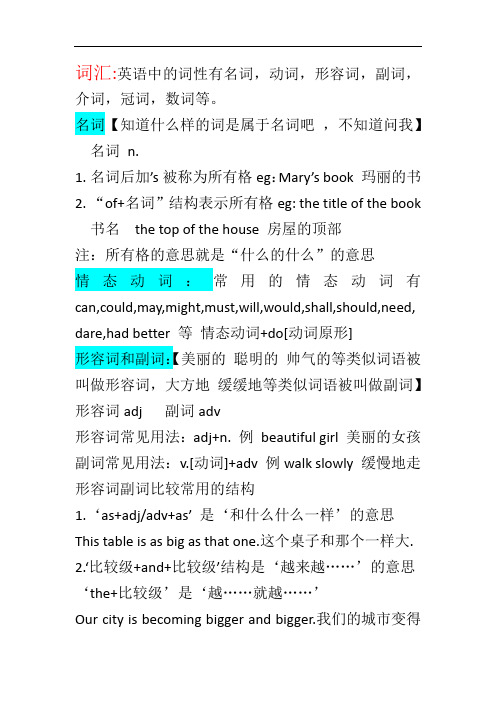
词汇:英语中的词性有名词,动词,形容词,副词,介词,冠词,数词等。
名词【知道什么样的词是属于名词吧,不知道问我】名词n.1.名词后加’s被称为所有格eg:Mary’s book玛丽的书2.“of+名词”结构表示所有格eg: the title of the book 书名the top of the house 房屋的顶部注:所有格的意思就是“什么的什么”的意思情态动词:常用的情态动词有can,could,may,might,must,will,would,shall,should,need, dare,had better 等情态动词+do[动词原形]形容词和副词:【美丽的聪明的帅气的等类似词语被叫做形容词,大方地缓缓地等类似词语被叫做副词】形容词adj 副词adv形容词常见用法:adj+n. 例beautiful girl 美丽的女孩副词常见用法:v.[动词]+adv 例walk slowly 缓慢地走形容词副词比较常用的结构1.‘as+adj/adv+as’是‘和什么什么一样’的意思This table is as big as that one.这个桌子和那个一样大.2.‘比较级+and+比较级’结构是‘越来越……’的意思‘the+比较级’是‘越……就越……’Our city is becoming bigger and bigger.我们的城市变得越来越大。
(bigger是big的比较级)The more challenging the journey is,the happier the young people will feel. 旅行中的挑战越多,人们就会感到越幸福。
(challenging adj.有挑战的more challenging 是其比较级happier是happy的比较级)常见的介词:at,before,after,since,until,from,between,in, By,near,next to,for,on,with,because of,through.Eg: at room 在房间里before 3:00 在3点之前(上面的介词意思都很简单,不会的用手机查一下)冠词:冠词是修饰名词的有a,an,the.Eg: the desk 这个桌子an apple 一个苹果动词:用法及(动词常考常见的:break, bring, come, get, give, keep, look, take.查字典看看它们的意思,相关的短语)动词的时态若句子中出现‘often,usually,always等’词时,句子中的动词常用一般现在式;出现‘ago, just now,yesterday,last year等’时,动词用一般过去式;出现‘just,recently, lately,yet,already,so far等’时,动词用现在完成式;出现‘by the time, by the end of this year等’时,动词用将来完成式;出现‘for hours, since morning, all the time 等’时,动词用现在完成进行式。
英语B级复习资料

英语B级复习资料(一)动词的基本时态理论基础:什么是动词的时态?动词的时态,是指一种语言通过动词形式的变化来反映“动作时间”和“动作状态”---“时态”就是“动作时间+动作状态”的合称。
英语有“现在时、过去时、将来时、过去将来时”这样4种动作时间的区分,有“一般态、完成态、进行态、完成进行态”这样4种动作状态的区分。
对“动作时间”和“动作状态”进行排列组合,我们可以得到下面的结果:时间\ 状态一般(态)完成(态)进行(态)完成进行(态)现在时一般现在时现在完成时现在进行时现在完成进行时过去时一般过去时过去完成时过去进行时过去完成进行时将来时一般将来时将来完成时将来进行时将来完成进行时过去将来时一般过去将来时过去将来完成时过去将来进行时过去将来完成进行时B.例题讲解1)When Lily came home at 5 p.m. yesterday, her mother ______ dinner in the kitchen. (《大学英语》(B)Test 1, 36)A. cookedB. was cookingC. cooksD. has cooked解析:B。
此题意思为:当Lily昨天下午五点回家时,妈妈正在厨房里做饭。
用过去进行时。
2)John’s father ______ mathematics in this school ever since he graduated from Harvard University. (《大学英语》(B)Test 1, 40)A. taughtB. teachesC. has taughtD. is teaching解析:C。
此题意思为:约翰的父亲自从哈佛大学毕业后就一直在这所学校读书,这种状态一直持续到现在,所以句子用现在完成时。
3)I was giving a talk to a large group of people, the same talk I ______ to half a dozen other groups before. (《大学英语》(B)Test 2, 45)A. was givingB. am givingC. had givenD. have given解析:C。
英语b级语法重点总结必备语法

英语b级语法重点总结必备语法大学英语b级考试中,掌握哪些英语语法比较实用?下面是店铺给大家整理的英语b级语法,供大家参阅!英语b级语法:名词A. 知识要点名词可分为可数名词和不可数名词。
可数名词有单、复数之分。
1.不可数名词只用单数形式。
如果要表示数量多少,需在其前面加量词来表达。
如:a piece of news(一条新闻);two pieces of advice(两条建议)2.名词所有格的构成是名词加“’s”,如:Mary’s room;如原词已有复数词尾-s,则只加“’”,如:the students’ hall, 通常用于有生命的存在物的名词;名词所有格也可以由介词of加名词构成,通常用于无生命的存在物的名词, 如:the window of the classroom.B.例题讲解What a beautiful house! Especially there are many ______.A. furnitureB. furnituresC. pieces of furnitureD. pieces of furnitures解析:此题考查名词的单复数。
Furniture 为不可数名词,后面不能加s。
很多家具用many pieces of furniture,因此答案为C。
英语b级语法:代词代词用于指代。
包括:人称、物主、反身、疑问、不定代词等。
1.many, few和a few一般只能修饰或指代可数名词,much, little 和a little 一般只能修饰或指代不可数名词。
a few 和a little表示“有一些”,具有肯定意义,而few和little表示“几乎没有”,具有否定意义。
many和much表示“许多”。
2.表示“全部”:两者用both,三者以上用all;表示“全无”:两者用neither,三者以上用none或no one;表示“任一”:两者用either,三者以上用any。
大学英语B级语法重点.docx
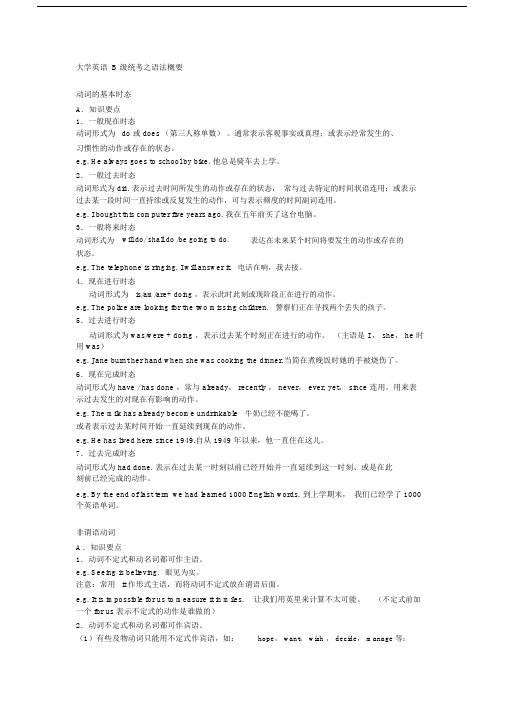
大学英语 B 级统考之语法概要动词的基本时态A.知识要点1.一般现在时态动词形式为do 或 does (第三人称单数)。
通常表示客观事实或真理;或表示经常发生的、习惯性的动作或存在的状态。
e.g. He always goes to school by bike. 他总是骑车去上学。
2.一般过去时态动词形式为 did. 表示过去时间所发生的动作或存在的状态,常与过去特定的时间状语连用;或表示过去某一段时间一直持续或反复发生的动作,可与表示频度的时间副词连用。
e.g. I bought this computer five years ago. 我在五年前买了这台电脑。
3.一般将来时态动词形式为will do/ shall do /be going to do.表达在未来某个时间将要发生的动作或存在的状态。
e.g. The telephone is ringing. I will answer it.电话在响,我去接。
4.现在进行时态动词形式为is/am/are+ doing ,表示此时此刻或现阶段正在进行的动作。
e.g. The police are looking for the two missing children.警察们正在寻找两个丢失的孩子。
5.过去进行时态动词形式为 was/were + doing ,表示过去某个时刻正在进行的动作。
(主语是 I , she, he 时用 was)e.g. Jane burnt her hand when she was cooking the dinner.当简在煮晚饭时她的手被烧伤了。
6.现在完成时态动词形式为 have / has done ,常与 already, recently , never, ever, yet, since 连用。
用来表示过去发生的对现在有影响的动作。
e.g. The milk has already become undrinkable牛奶已经不能喝了。
B级常见考点

B级常见考点一、Listening comprehension:*一定在听之前抓紧时间看考题,大致分析出需要听的重点,尤其是section B,这样可以省时间,不影响听下一道题,还可以提高正确率。
如果实在没听懂的话,别纠结,直接下一题,别因为一道题,而连锁反应影响下面所有的题。
1.Section A:问答题(1)一般疑问句,如果选项中有用YES/NO作答的,通常为正确答案(2)What time/When…..? 问时间(3)Can/Could/May/Will….?表示委婉的请求,愿意用of course/certainly/my pleasure等作答,不愿意用sorry等表示歉意的话作答。
(4)How do you like/What do you think of…?表示对…的看法(5)What do/does sb. do? 问职业(6)How long/often/soon/…?多长时间?多久(问频率)?多快。
(7)对感谢的话的回复:You are welcome./It’s my pleasure.等。
(8)选择疑问句,选项中有选其中之一的为正确答案。
2.Section B: 对话题(1)选项中表示地点的,重点听与地点有关的内容。
常见地点:office/shop/hospital/bank/hotel/post office/school等。
(2)选项中表示人与人关系的,重点听与职业有关的内容。
常见关系:secretay-boss/student-techer/patient-doctor/customer-salesman/husband-wife/child-pa rent等(3)选项中表示行为的,重点听与做过的或打算去做的事有关的内容,小心干扰项。
(4)选项中表示时间的,重点听与时间有关的内容。
注意数字的发音,比如three/thirteen/thirty等。
(5)选项中表示物品的,重点听与物品有关的内容。
英语B级知识点总结

Part 1 Listening Comprehension 高频考点
Section A 一般疑问句:1.Be(Is/Am/Are)+主+...?
eg.Is there anything I can do for you? — Yes,it is./No,it isn’t.
— Sure./Of course./Ok./All right. eg.Would you like something to drink?
— Yes,please/No, thanks./Coffee,please(例). eg.Shall we start to talk the plan?
— Good idea.
Part 2 Vocabuary&Structure 高频考点
Section A 一、词义辨析: • 名词:purpose n.目的,意图—— advice n.建议—— suggestion n.建议—— proposal n.建议,
提议—— agreement n.协议 —— contract n.合同—— position n.职位—— business n.商务—— trade n.交易,买卖—— experience n.经验,教训—— decision n.决定—— invitation n.邀请— —thought n.想法—— opinion n.观点,看法—— idea n.想法,主意 • 形容词:available adj.可得到的,可到达的—— convenient adj.便利的,方便的—— affordable adj.付得起的—— sustainable adj.可持续的—— attractive adj.有吸引力的,诱人的— — experienced adj.有经验的——professional adj.专业的,内行的 • 动词:explain v.解释—— reach v.到达,联络—— show v.展示表明—— offer v.提供—— provide v.提供—— inform v.通知—— remind v.使想起—— share v.分享—— spend v.花费—— finish v.结束—— rent v.租—— complete v.完成—— require v.需要——result v.导致—— cause v.导致—— apply v.申请—— expect v.期待,期望—— depend v.依赖,依靠—— rely v.信赖, 依靠
大学英语B级词汇、语法重点及练习(专项训练)

⼤学英语B级词汇、语法重点及练习(专项训练)⼀.名词1.常见的不可数名词advice luggage bread damage food equipment furniture hair homework housework information knowledge progress population2.可数名词的特殊形式1)“s”结尾,单复同形means series species works2)形式上是单数,但⽤作复数police mankind people cattle audience3)合成名词的单复数变化,通常在主⼲词上加“s”brother-in-law (单数)brothers-in-law (复数)passer-by (单数)passers-by (复数)story-teller (单数)story-tellers (复数)⼆.形容词1.形容词可以跟在以下半系动词的后⾯做表语appear turn feel become stay look come prove grow go get keep2.容易混淆的形容词alone lonely alive living liveclean clear considerate considerable continual continuous dead deadlyeconomical economic efficient effective healthful healthy intense intensive imaginary imaginable imaginativesensitive sensible successful successive valuable invaluable pricelessvalueless worthless historical historic respectable respectful respectivelike likely alike三.副词1.有些形式相异的副词,意义差别也⽐较⼤,如:high highly just justly hard hardly free freely late lately most mostly near nearly2.些形容词也以-ly结尾,应避免误⽤为副词,如:lively lovely lonely friendly ugly costlysilly3.形容词和副词只差⼀个词尾,但意义⼤相径庭hard hardly like likely bare barelybad badly scarce scarcely四.介词1.介词和名词的搭配1)名词+ aboutconcern about remark about complaint aboutopinion about doubt abouthope for need for sorry for reason fortalent for3)名词+ fromabsence from difference from protection from 4)名词+ inconfident in delight in difficulty in experience in faith in pride in success in trust in5)名词+ ofaccount of capability of care of description of feeling of habit of impression of intention of number of pleasure of possibility of shortage of 6)名词+ on (upon )authority on dependence on effect on remark on emphasis on influence on impression on stress on7)名词+ overadvantage over control over quarrel over victory over worry over8)名词+ toanswer to access to attention to approach to contrast to exception to gratitude to invitation to limit to objection to reference to solution to9)名词+ withagreement with contact with common with connection with conversation with trouble with 2.介词+ 名词的固定搭配at ease at first at last at crossroads at leastat large at once at a loss at present at willby accident by chance by turns for certainin general in a sense in theory in practicein the way in the past in the future in advance in return in turn in that event in some respects in a hurry in addition in fact in place in sighton average on duty on vacation3.介词和形容词的搭配1)形容词+ aboutanxious about careful about curious about concerned about careless about certain about particular about doubtful about2)形容词+ atangry at annoyed at good at quick at pleased at 3)形容词+ foranxious for convenient for eager for famous for hungry for known for late for necessary for possible for ready for responsible for suitable for 4)形容词+ fromabsent from different from distant from free from far from protected from5)形容词+ ofafraid of aware of ashamed of capable of considerate of conscious of composed of deprived of full of fond of independent of proud of regardless of sick of short of tired of thoughtful of6)形容词+ toaccustomed to contrary to convenient to devoted to essential to familiar to favorable to opposed to peculiar to relevant to be used to beneficial to7)形容词+ inabsorbed in confident in disappointed in experienced in interested in lacking in lost in rich in successful in8)形容词+ withassociated with annoyed with angry withbusy with friendly with nervous with patient in⼀.单词1. She has been busy after she became the manager. Her working day often __ well into the night.A. expandsB. expendsC. extendsD. extents2. This __ him to the first rank among the writers of fiction.A. raisedB. liftedC. roseD. made3. It is arranged that the opening ceremony will __ at 10:00 Wednesday morning next week.A. happenedB. occurC. appearD. take place4. The sight __ to me the days of my childhood in the countryside.A. remindedB. recalledC. rememberedD. recommended5. Good transportation is essential to the __ growth of the country.A. economyB. economicalC. economicsD. economic6. The judge’s order to arrest me was no longer __.A. creativeD. competent7. Burglars broke is into the __ flat while the Whites were on holiday.A. vacantB. blankC. bareD. empty8. She is engaged in __ research.A. historicalB. historicC. historyD. histrionic9. She had never felt so __ and helpless in her life.A. alongB. lonelyC. aloneD. aloud10. As far as hobbies are concerned, Tom and his brother have little in __ .A. commonB. averageC. popularD. normal11. The restoration of China’s lawful rights in the United Nations was a great __ in history.A. caseB. incidentC. accidentD. event12. Mr. Smith will leave for New Y ork in__November.A. lateB. latelyC. later__ .A. senseB. senselessC. sensitiveD. sensible14. It’s almost __ that our team will win.A. certainB. sureC. exactD. accurate15. Some people in the back row were __ al the time during the lecture.A. speakingB. talkingC. sayingD. replying16. The school is going to __ the sports meeting to next week.A. postponeB. delayC. replaceD. exchange17. People can’t bear this __ hot weather.A. continualB. continuousC. variousD. variety18. Educational TV stations offer teaching in various __ ranging from home nursing to art appreciation.A. directionsB. pointsC. occurredD. subjects19. I didn’t know what to do but when an idea suddenly __ .A. happenedB. entered20. Waiter in restaurants __ all kinds of food and drink to customers.A. entertainB. serveC. provideD. offer⼆.固定搭配1. The failure in examination __ his inadequate preparation.A. resulted inB. resulted fromC. led toD. let in2. The party __ us to turn grief into strength.A. called offB. called atC. called onD. called to3. He __ a number of journals for his information.A. went throughB. saw throughC. looked throughD. notice through4. We have run __ typing paper.A. intoB. overC. onD. out of5. Scientists will have to __ new methods of increasing the world’s food supply.A. come up toB. come up withC. come up forD. come put of6. you can __ our family whenever you are in need of assistance.A. associate withD. relate to7. The “lost money” __ to be in the safe all the time.A. turned intoB. turned outC. turned overD. turned down8. “Psychology” is __ the study of human behavior by scientific methods.A. defined asB. taken asC. regarded asD. believed as9. John found it extremely difficult to __ his had habitsA. do withoutB. dispose ofC. clear upD. do away with10. They could hardly believe that the trouble should __ the new engine of the car.A. lie inB. turn toC. come toD. bring down11. We didn’t tell her the sad news for fear that she might not __ the heavy blow.A. come up withB. make up forC. put up withD. stand up for12. The chairman put __ his plan, expecting that everyone would approve it.A. towardB. up13. Y ou must take into __ the boy’s long illness.A. accountB. conditionC. chanceD. calculation14. I don’t like to disturb you, because you’re quite tired __ working hard today.A. onB. fromC. outD. of15. Unlike most Chinese, many Americans __ bread and eggs for breakfast every morning.A. used to eatB. are used to eatC. are used to eatingD. used to eating16. Y ou should learn to take __ of every opportunity to improve oral English.A. chanceB. useC. actionD. advantage17. I took someone’s umbrella by __ .A. heartB. mistakeC. natureD. the way18. Some men broke __ the central bank near the post office last Sunday.A. intoB. upC. offnot notice me enter the room.A. onB. inC. ofD. at20. He tried to make __ all the trouble he had caused.A. outB. upC. forD. up for三.语法1. In the last ten years, great changes __ in my hometown.A. have been taken placeB. took placeC. was taken placeD. have taken place2. He discovered that his luggage __ stolen.A. had beenB. has beenC. wasD. would be3. I __ everything by the time you get back next time.A. shall finishB. will be finishingC. have finished C. shall have finished4. I have no doubt __ he will overcome all his difficulties.A. whetherB. whichC. thatD. if5. The science __ deals with the law of nature is calledB. whoC. by whichD. whom6. The city __ my father grew up is not far from here.A. whatB. whereC. whereverD. which7. __ you lice next door to Mr. Roberts, you ought to be able to recognize him.A. AlthoughB. SinceC. WhereD. Unlike8. Anyone can borrow books from this library __ he keeps them clean.A. even ifB. unlessC. as long asD. so that9. All matter is made of atoms, which are too small __ even through the most powerful microscope.A. to be seemB. to see themC. to have seenD. to be seeing10. Every day they spend a lot of time __ their assignments.A. to doB. on doingC. by doingD. doing11. __ five successful novels, she published a collection of short stories.A. Having been written C. WritingB. Having Written D. To write12. What do you think of the performances __ by the girls of Grade III?A. givingB. gaveC. having givenD. given13. It is necessary that the project __ before next Monday.A. be completedB. is completedC. is to be completedD. will be completed14. I lift very early last night, but I wish I __ so early.A. haven’t leftB. didn’t leaveC. hadn’t leftD. couldn’t leave15. I was ill that day. Otherwise I __ the meeting.A. would have attendedB. would attendC. attendedD. should had attended五.以单词正确的形式填空1. Y ou’d better _____ (copy) the whole article at once.2. The manager promised ____ (get) me a position in his company.3. Remember ____ ( lock) the door when you leave.4. The main benefit of ____ (work) with the company is the opportunity to travel abroad.5. I don’t mind ____ (have) a dog in the house so long as it’s clean and it doesn’t smell.6. Did you have any difficulty _____ (get) a visa to Britain?7. The children from the U.S. got used to ____ (eat)Chinese food quite soon.8. They stopped ____ (search) for the missing plane as the weather was very rough.9. If you intend ____ (visit) the National Garden, please contact me soon.10. I wondered why the boy often avoided ____ (talk) with his classmates.11. To my ____ (surprising), he passed the test.12. In recent years, Japan has to become less ____ (depend) on importing fish from other countries.13. He told me that it was not his fault, he was not_____ (response)for the accident.14. The weather here is ____ (change). Y ou’d better bring a rain coat with you in case it rains.15. Although I do not share his religious ____ (believe), I respect him.16. When I apply for jobs, I find I am always at a ____ (advantage) because I can’t drive.。
英语B级考试知识点

反复复习:定期复习已学过的词汇以巩固记忆。
记叙文:描述事件、人物或场景考查学生对细节的理解和把握。 议论文:阐述观点、立场或主张考查学生对论点、论据的把握和分析。 说明文:解释、阐述某个概念或事物考查学生对事实、数据的理解和分析。 新闻报道:报道新闻事件考查学生对新闻要素的理解和把握。
阅读技巧:掌握如预 测答案、定位关键信 息和筛选无关信息等 阅读技巧提高阅读效 率。
细节理解题:根据文章中的具体信息来回答问题。 主旨大意题:概括文章的中心思想或主题。 推理判断题:根据文章中的信息推断出隐含的意义或结论。 词汇理解题:解释文章中某个单词或短语的用法或意义。
内容完整:文章应包含所有必要的信息如主题、论点、结论等。 结构清晰:文章应有一个明确的开头、中间和结尾段落之间逻辑清晰。 语法准确:句子结构应正确没有语法错误符合英语语法规范。 词汇丰富:使用多种词汇避免重复使用同一词汇。 评分标准:根据以上要求评分为满分、良好、及格和不及格四个等级。
细节理解题:根据文章中 的具体信息回答问题
推理判断题:通过文章中 的信息推断出答案
主旨大意题:概括文章的 中心思想或主题
词汇理解题:根据上下文 推测生词的含义
快速阅读训练:通 过阅读英文文章逐 渐提高阅读速度和 理解能力。
词汇积累:扩大词 汇量提高对英文文 章的理解能力。
语法知识:掌握基 本的语法知识有助 于理解句子结构和 文章意思。
添加文档副标题
目录
01.
02.
03.
04.
05.
06.
目的:检验学生的英语水平 是否达到B级要求
意义:为学生提供英语学习的 方向和目标促进英语学习的积
202X年大学英语B级考试复习重点及做题技巧
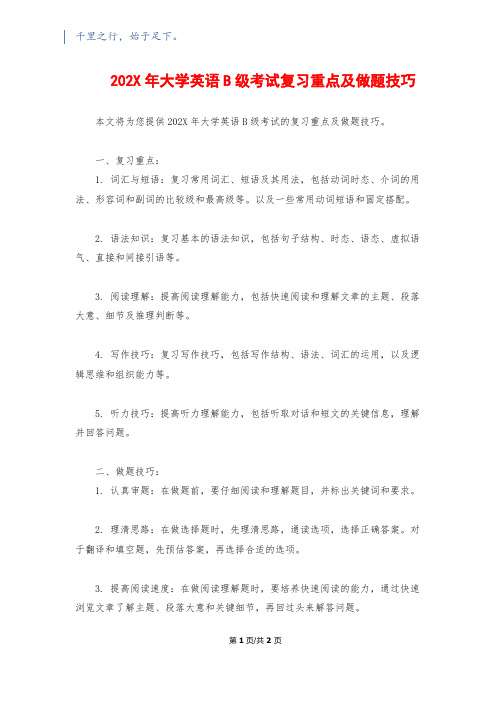
千里之行,始于足下。
202X年大学英语B级考试复习重点及做题技巧本文将为您提供202X年大学英语B级考试的复习重点及做题技巧。
一、复习重点:1. 词汇与短语:复习常用词汇、短语及其用法,包括动词时态、介词的用法、形容词和副词的比较级和最高级等。
以及一些常用动词短语和固定搭配。
2. 语法知识:复习基本的语法知识,包括句子结构、时态、语态、虚拟语气、直接和间接引语等。
3. 阅读理解:提高阅读理解能力,包括快速阅读和理解文章的主题、段落大意、细节及推理判断等。
4. 写作技巧:复习写作技巧,包括写作结构、语法、词汇的运用,以及逻辑思维和组织能力等。
5. 听力技巧:提高听力理解能力,包括听取对话和短文的关键信息,理解并回答问题。
二、做题技巧:1. 认真审题:在做题前,要仔细阅读和理解题目,并标出关键词和要求。
2. 理清思路:在做选择题时,先理清思路,通读选项,选择正确答案。
对于翻译和填空题,先预估答案,再选择合适的选项。
3. 提高阅读速度:在做阅读理解题时,要培养快速阅读的能力,通过快速浏览文章了解主题、段落大意和关键细节,再回过头来解答问题。
第1页/共2页锲而不舍,金石可镂。
4. 注意语境:在做句子翻译和填空题时,要注意上下文的语境,理解和使用正确的词汇和语法结构。
5. 多做模拟题:通过做多种类型的模拟题,培养应试技巧和提高答题速度,熟悉考试题型和题目难度,提前适应考试环境。
三、其他复习建议:1. 制定复习计划:根据自己的时间安排,制定合理的复习计划,并按计划进行复习。
合理分配时间,重点复习薄弱环节。
2. 多听多读多练:多听英语听力材料,提高听力理解能力;多读英语文章,积累词汇和理解能力;多做练习题,巩固知识点和提高答题技巧。
3. 考前冲刺:离考试日期越近,要加强复习内容的总结和巩固,多做模拟题,查漏补缺。
4. 调整心态:保持积极的心态,相信自己的能力,充分准备和信心可以获得好成绩。
总之,复习重点是掌握常用词汇短语、基本语法知识、阅读理解和写作技巧。
英语B级考试知识点

organize---organization responsible---responsibility apply---application/applicant require---requirement
manage-manager/management
agree---agreement
move---movement
词, 要把所给的词变名词)
introduce---introduction
achieve---achievement
impress---impression improve--improvement
educate---education invest---investment
different---difference grow---growth equip---equipment
9.enjoy doing 喜欢做… 10. spend …… doing 花 (时间/钱)…做
例如:I spent two hours finishing my term paper. 我花了 两小时完成了学期论文。
11.get used to doing sth. 习惯于做…
used to do sth. 过去常常做… 例如:I get used to getting up early. 我习惯早起。
第十四页,编辑于星期三:五点 四十二分。
比较级、最高级
1. than 句中要用比较级 -er / more+形容词 / 不规则变化
good well (better)
2. the + 比较级 …., the + 比较级 … 越…越… 3. of all …./one of…. 句中要用最高级 –est / the most+形容 词 / 不规则变化 1) The climate is warmer in the south in winter than that in the north. 复数用those 本句中的that 用来指代前句的climate; 若为复数则用
英语b级常考知识点
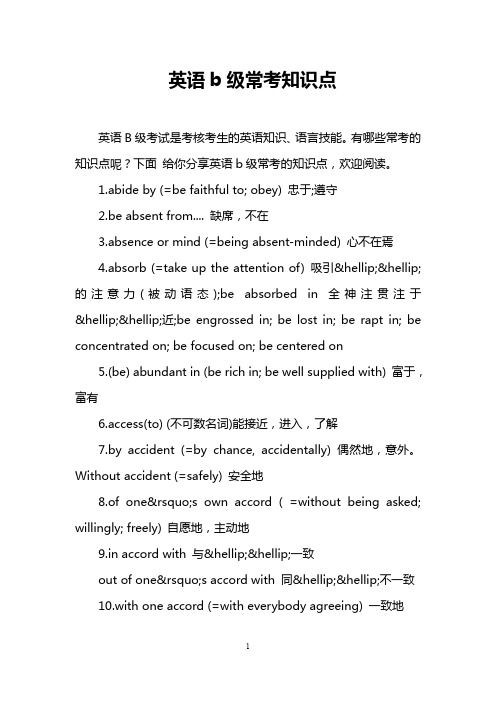
英语b级常考知识点英语B级考试是考核考生的英语知识、语言技能。
有哪些常考的知识点呢?下面给你分享英语b级常考的知识点,欢迎阅读。
1.abide by (=be faithful to; obey) 忠于;遵守2.be absent from.... 缺席,不在3.absence or mind (=being absent-minded) 心不在焉4.absorb (=take up the attention of) 吸引……的注意力(被动语态);be absorbed in 全神注贯注于……近;be engrossed in; be lost in; be rapt in; be concentrated on; be focused on; be centered on5.(be) abundant in (be rich in; be well supplied with) 富于,富有6.access(to) (不可数名词)能接近,进入,了解7.by accident (=by chance, accidentally) 偶然地,意外。
Without accident (=safely) 安全地8.of one’s own accord ( =without being asked; willingly; freely) 自愿地,主动地9.in accord with 与……一致out of one’s accord with 同……不一致10.with one accord (=with everybody agreeing) 一致地11.in accordance with (=in agreement with) 依照,根据12.on one’s own account1)为了某人的缘故,为了某人自己的利益2)(=at one’s own risk) 自行负责3)(=by oneself) 依靠自己on account 赊账;on account of 因为;on no account 不论什么原因也不;of ……account 有……重要性。
英语B级复习要点考点整理
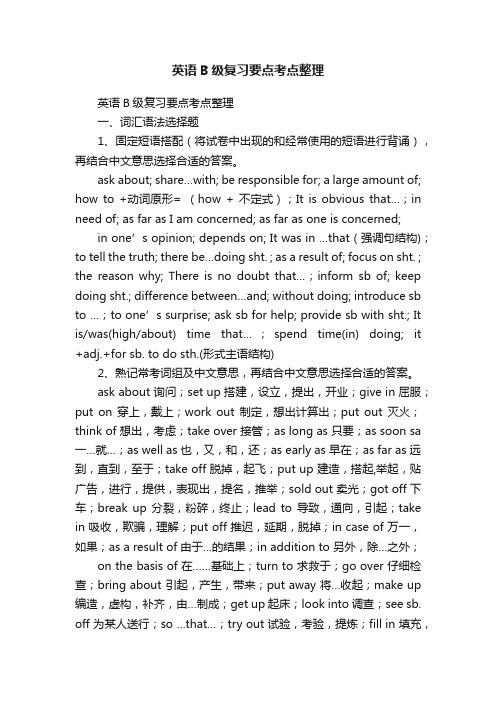
英语B级复习要点考点整理英语B级复习要点考点整理一、词汇语法选择题1、固定短语搭配(将试卷中出现的和经常使用的短语进行背诵),再结合中文意思选择合适的答案。
ask about; share...with; be responsible for; a large amount of; how to +动词原形= (how + 不定式);It is obvious that (i)need of; as far as I am concerned; as far as one is concerned;in one’s opinion; depends on; It was in …that(强调句结构);to tell the truth; there be…doing sht. ; as a result of; focus on sht. ; the reason why; There is no doubt that…;inform sb of; keep doing sht.; difference between…and; without doing; introduce sb to …;to one’s surprise; ask sb for help; provide sb with sht.; It is/was(high/about) time that…;spend time(in) doing; it +adj.+for sb. to do sth.(形式主语结构)2、熟记常考词组及中文意思,再结合中文意思选择合适的答案。
ask about 询问;set up 搭建,设立,提出,开业;give in 屈服;put on 穿上,戴上;work out 制定,想出计算出;put out 灭火;think of 想出,考虑;take over 接管;as long as 只要;as soon sa 一…就…;as well as 也,又,和,还;as early as 早在;as far as 远到,直到,至于;take off 脱掉,起飞;put up 建造,搭起,举起,贴广告,进行,提供,表现出,提名,推举;sold out 卖光;got off 下车;break up 分裂,粉碎,终止;lead to 导致,通向,引起;take in 吸收,欺骗,理解;put off 推迟,延期,脱掉;in case of 万一,如果;as a result of 由于…的结果;in addition to 另外,除…之外;on the basis of 在……基础上;turn to 求救于;go over 仔细检查;bring about 引起,产生,带来;put away 将…收起;make up 编造,虚构,补齐,由…制成;get up 起床;look into 调查;see sb. off 为某人送行;so …that…;try out 试验,考验,提炼;fill in 填充,填写,填满,替代;put down 放下,拒绝;turn out 关掉,驱逐;take in 接受,吸收;ask for 请求,寻找;give up 放弃,停止;drew up 草拟;pick up 学会,捡起,获得;turn up 找到,出现;come up to 达到,符合;go along with 一起去,赞同;run out of 用尽;take charge of 负责;in part 在一定程度上;in person 亲自;in turn 轮流,依次;in place 现成地,在原地;take away 拿走,取走;put forward 提出;look after 照看,照料;get on 上车,生活,融洽相处,进展;ran into 撞上,偶遇,陷入;put on 穿上,装出,增加;shut down (把窗子等)关上,(使)机器等关闭,停车;break out 爆发,突发;turn out 证明是,原来是;set out 出发,开始;3、判断词语的意思,再结合句子意思选择合适的答案。
英语b级考试知识点

英语b级考试知识点 英语B级考试的重要性不⾔⽽喻。
有哪些重要的知识点呢?下⾯店铺给你分享英语b级考试的知识点,欢迎阅读。
英语b级考试知识点:冠词 冠词是⼀种虚词,⽤在名词前⾯,说明名词是特指还是泛指。
冠词分不定冠词和定冠词。
1. 不定冠词: a / an表⽰“⼀”、“某⼀”概念,⽤于单数可数名词前。
a⽤在辅⾳开头的词前,an⽤在元⾳开头的词前。
如: an English teacher/ a second year⼀位⽼师/⼜⼀年; 2. 定冠词:the表⽰“特指的⼀个或⼀些”。
通常⽤在形容词最⾼级及序数词前,或世界上独⼀⽆⼆的事物前;也⽤于乐器名词前。
如: the best season最好的季节/the first lady第⼀夫⼈/the earth 地球/play the piano 弹钢琴; 3. 不使⽤冠词的情况:在三餐饭、球类运动和娱乐活动的名称之前。
在某些惯⽤词中也不⽤冠词,以具体名词表⽰抽象概念。
如: have lunch吃午饭/ play basketball打篮球/ go to school上学 英语b级考试知识点:名词 名词可分为可数名词和不可数名词。
可数名词有单、复数之分。
1.不可数名词只⽤单数形式。
如果要表⽰数量多少,需在其前⾯加量词来表达。
如:a piece of news(⼀条新闻);two pieces of advice(两条建议)2.名词所有格的构成是名词加“’s”,如:Mary’s room;如原词已有复数词尾-s,则只加“’”,如:the students’ hall, 通常⽤于有⽣命的存在物的名词;名词所有格也可以由介词of加名词构成,通常⽤于⽆⽣命的存在物的名词, 如:the window of the classroom. 英语b级考试知识点:数词 数词分为两⼤类:基数词和序数词。
1.基数次表⽰数量(one, two, three…),序数次表⽰次序(first, second, third…)。
- 1、下载文档前请自行甄别文档内容的完整性,平台不提供额外的编辑、内容补充、找答案等附加服务。
- 2、"仅部分预览"的文档,不可在线预览部分如存在完整性等问题,可反馈申请退款(可完整预览的文档不适用该条件!)。
- 3、如文档侵犯您的权益,请联系客服反馈,我们会尽快为您处理(人工客服工作时间:9:00-18:30)。
13.
14.
15.
16.
17.
18.
19.
in addition to… 除…外还有 be surprised at 对…感到惊讶 expect sb. to do … 期望某人做… in detail 详细地
20.
21.
22.
23.
depend on 依靠,依赖
be interested in 对… 感兴趣 sell out .卖完了 be sold out(被动式)
2. No sooner …than… / Hardly … when … 一…就(要倒 装)
例如:No sooner had
rain.
I got home than it began to
3. so that 以便 / in case以防
4. now that / in that = because / since 既然(表原因)
考查倒装
1. Only at that time did we realize we did
wrong. (句首Only+状语)
2. Not until we got home did we find our dog
was lost. 3. No sooner had we got home than it rained.
cost-costly 昂贵
hope---hopeful use---useful
bore---boringlose---lost
help---helpful
experience-experienced miss---missing
surprise---surprising/surprised
interest---interesting/interested
比较级、最高级
1. than 句中要用比较级 -er / more+形容词 / 不规则 变化good well (better)
2. the + 比较级 …., the + 比较级 … 越…越…
3. of all …./one of…. 句中要用最高级 –est / the most+ 形容词 / 不规则变化 1) The climate is warmer in the south in winter than that in the north. 复数用those
5. as long as 只要…
6. unless除非…否则 = if … not …. 例如:you can’t go out unless you finish your homework. 7. not … until… 直到。。。才。。。 例如:I didn’t get up until 9 o’clock. 我直到9 点才起床。
24.
25.
26.
take advantage of 利用
sales manager 销售经理 marketing manager 市场部经理 HR manager 人力资源处经理 lead to 导致
27.
28.
29.
30.
短语
1.
the moment / the minute / every time / as soon as 一 …就 … 例如:as soon as I arrive at the airport, I will call you. 我一到机场就打电话给你。
different---difference
invite---invitation
grow---growth
equip---equipment
appoint---appointment
suggest---suggestion disappoint---disappointment
possible---possibility complain---complaint
deep---deeply
effective---effectively
quick---quickly frequent---frequently
serious---seriously
clear---clearly
final---finally
பைடு நூலகம்
wide---widely heavy---heavily easy---easily
17. refuse to do
18. be asked to do
19. be required to do
20. be allowed to do
21. be believed to do
22. be expected to do / expect sb. to do sth. 期望
be sorry to do sth. 抱歉做…
本句中的that 用来指代前句的climate; 若为复数则用
those 指代
主谓一致
1) Dr. Smith, together with his wife and three
children, (be) is to see film this afternoon.
2) Dr. Smith, along with his wife and three
children, (be) is to see film this afternoon.
词变形
变副词(在句中不出现than的情况下) + ly 用来修饰动词, 形容词及其他副词
fortunate---fortunately
obvious---obviously
general---generally
例如:I’m sorry to have done the damage to your
company. 抱歉给公司造成了损失。
23. Impressed by …
24. Encouraged by… 25. Judged by … 26. Shocked by … When (ask) asked how the sales promotion was, the manager said it was a great success. 27. Compared with /to …
8.before / 介词 + doing 在做…之前
9.enjoy doing 喜欢做…
10. spend …… doing 花 (时间/钱)…做
例如:I spent two hours finishing my term paper. 我花
了两小时完成了学期论文。
11.get used to doing sth. 习惯于做…
变形容词---变副词
success---successful---successfully person---personal---personally comfort---comfortable---comfortably luck---lucky---luckily reason---reasonable---reasonably effect---effective---effectively
have difficulty doing 做…有困难
give up doing 放弃做某事
14. It’s no use doing … 做…无用 15. It’s no good doing… 做…没好处 16. forget to do 忘记去做 forget doing 做过… 忘了 remember to do 记得去做 remember doing 做过…记得
produce/ product 生产/产品
10.
in the need of 需要 be responsible for… 对…负责
11.
12.
in one’s opinion 在…看来
share…with … 与…分享 at once 马上,立刻 work out 制定,算出 as far as I am concerned 就我所知 set up 建立 be worth doing 值得做…
虚拟语气考查:
1. If …had done…,…would/might/.should have done…
(与过去事实相反)
2. If I were a rich man, I would buy the whole building. (与现在事实相反) 3. It is high time that … did … 4. It is important that … should + do 5. suggest/recommend/require/insist/demand/order后的 从句中 should + do
时态
1. By +过去时间: had done By the end of last term, we had learned 20 units. 2. By + 将来时间: will have done By the end of this term, they will have learned 1000 words.
3. by now for ten years since in the past ten years/ in the past decade 现在完成时 have done
强调句
It is/was … that… 多为考查强调句
There is no evidence that… There is no doubt that …
organize---organization responsible---responsibility apply---application/applicant require---requirement manage-manager/management agree---agreement move---movement employ--employment/employer/employee
